Top titles for eager environmentalists and dedicated eco warriors
At its core, intersectional environmentalism is about how injustices against the planet interconnect with and amplify injustices against people, in particular Black people, Indigenous people, people with disabilities and people living in poverty. These 29 books are required reading for anyone hoping to understand the past, present and future of intersectional environmentalism.
1. The Intersectional Environmentalist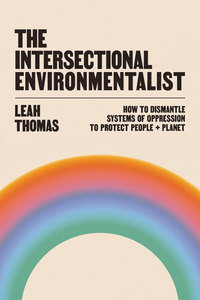
The Intersectional Environmentalist: How to Dismantle Systems of Oppression to Protect People + Planet (Voracious, 2022) is the first book by activist Leah Thomas, better known as Green Girl Leah. It explores the link between environmentalism, racism and privilege, suggesting that saving the environment and fighting for civil rights must happen together in order to be successful.
2. The Black Agenda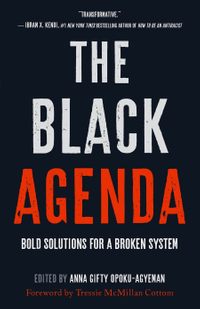
Edited by Anna Gifty Opoku-Agyeman, The Black Agenda: Bold Solutions for a Broken System (St. Martin’s Press, 2022) is a collection of essays by Black experts who examine how racism plays a part in everything from healthcare and education to criminal justice and the climate crisis. The essays offer ideas for fixing the American system, not just for people of colour, but for everyone.
3. Fresh Banana Leaves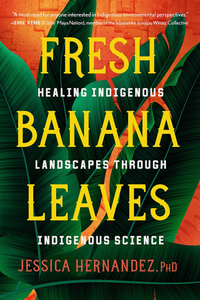
In Fresh Banana Leaves: Healing Indigenous Landscapes Through Indigenous Science (North Atlantic Books, 2022), Jessica Hernandez argues that mainstream conservationism isn’t working, thanks to centuries of racism, colonialism and capitalism. A Maya Ch’orti’ and Zapotec environmental scientist, she examines what Indigenous science can teach us all about land stewardship and protecting the natural environment.
4. All We Can Save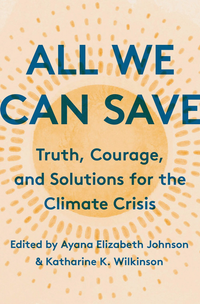
Edited by Ayana Elizabeth Johnson and Katharine K. Wilkinson, All We Can Save: Truth, Courage, and Solutions for the Climate Crisis (One World, 2021) is filled with provocative essays, poems and art by prominent women in the climate movement. These visionaries—scientists, teachers, lawyers, activists, designers and others—offer radical and, ultimately, hopeful ideas about how we can reshape society to solve the climate crisis.
5. White Skin, Black Fuel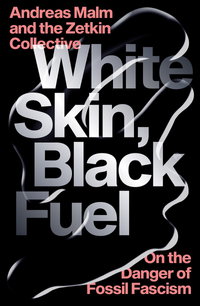
White Skin, Black Fuel: On the Danger of Fossil Fascism (Verso Books, 2021) by Andreas Malm and The Zetkin Collective is an insightful examination of the link between racism and the denial of climate change. It digs into the role that the far right has played in the climate crisis, arguing that fossil fuels have been steeped in racism from the very beginning.
6. Climate Change Is Racist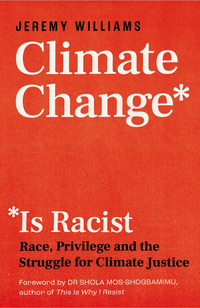
In Climate Change Is Racist: Race, Privilege and the Struggle for Climate Justice (Icon Books, 2021), Jeremy Williams scrutinizes the overlap between climate change and white privilege, showing how the climate crisis has been caused primarily by white people but affects mainly people of colour around the world.
7. A Bigger Picture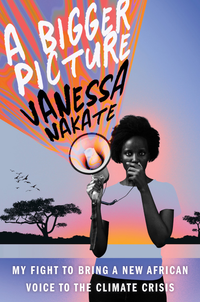
The debut book by Uganda’s first Fridays for Future protestor, A Bigger Picture: My Fight to Bring a New African Voice to the Climate Crisis (Mariner Books, 2021) shares Vanessa Nakate’s personal story along with her views on how African voices within the climate justice movement have been silenced worldwide. You may remember her as the young Ugandan climate activist who was cropped out of a photo by the Associated Press in 2020—her four peers, all white, were left in the image. Nakate’s book is equal parts memoir and manifesto.
8. How Women Can Save the Planet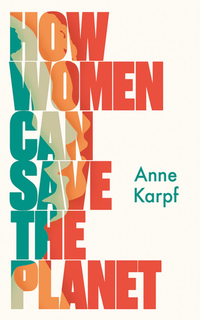
Women around the world disproportionately suffer the effects of the climate crisis, but women rarely have a say in establishing environmental policy. In How Women Can Save the Planet (Hurst Publishers, 2021), Anne Karpf provides vivid examples showing how the climate emergency and gender inequality are intrinsically linked—and offers hope that we can fix both.
9. Gonna Trouble the Water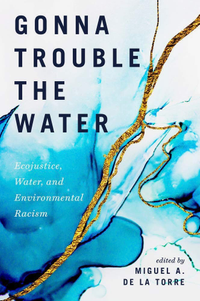
Edited by Miguel A. De La Torre, Gonna Trouble the Water: Ecojustice, Water, and Environmental Racism (The Pilgrim Press, 2021) is a collection of essays focussing on the intersection of environmentalism and racism, where water is treated as a commodity that can be exploited and weaponized against communities of colour. Contributors include a law professor and a former governor.
10. Climate Justice and Feasibility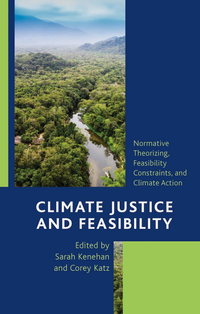
Climate Justice and Feasibility: Normative Theorizing, Feasibility Constraints, and Climate Action (Rowman & Littlefield, 2021) analyzes climate justice principles, policymaking and more. Edited by Sarah Kenehan and Corey Katz, this collection features voices from a range of disciplines and countries. Parallels are drawn between how the world tackled the COVID-19 pandemic and how we need to approach the climate crisis.
11. Form and Flow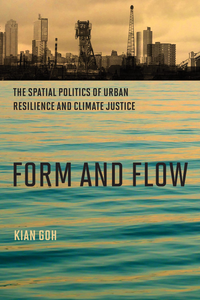
In Form and Flow: The Spatial Politics of Urban Resilience and Climate Justice (The MIT Press, 2021), Kian Goh looks at how community groups are mobilizing in cities such as New York, Jakarta and Rotterdam to fight back against urban climate change response strategies that are unjust and inequitable. She draws upon her own background in architecture and urban design to offer practical strategies and a vision for a just, equitable and sustainable urban future.
12. Waste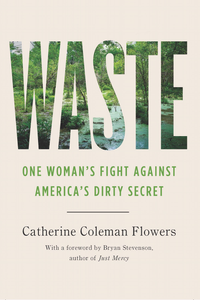
Waste: One Woman’s Fight Against America’s Dirty Secret (The New Press, 2020) is Catherine Coleman Flowers’s memoir about fighting for clean water and sanitation in Lowndes County, Alabama. The environmental justice champion explains how systemic prejudices regarding class, race and geography intersect, resulting in filthy living conditions in poor communities across the United States—and she reveals how climate change is making the problem worse and more widespread than ever before.
13. Climate Crisis and the Global Green New Deal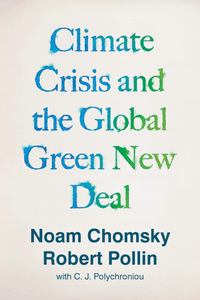
Climate Crisis and the Global Green New Deal (Verso Books, 2020) explains how the climate crisis can be overcome, both politically and economically, if humans stop burning fossil fuels while simultaneously reducing poverty and improving living standards. Written by political activist Noam Chomsky and progressive economist Robert Pollin, this compelling book provides a blueprint for transitioning to a green economy.
14. Tales of Two Planets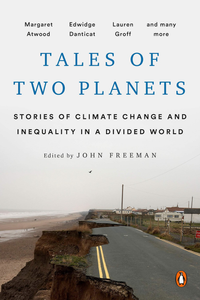
Tales of Two Planets: Stories of Climate Change and Inequality in a Divided World (Penguin Books, 2020) focusses on how the environmental crisis is making existing inequalities around the world even worse. Edited by John Freeman, with contributions from the likes of Margaret Atwood and Lauren Groff, this collection of fiction, essays, poetry and reporting emphasizes how climate change is hitting already vulnerable communities especially hard.
15. Winning the Green New Deal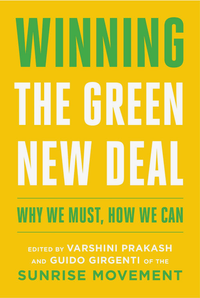
Winning the Green New Deal: Why We Must, How We Can (Simon & Schuster, 2020) outlines what humans must do to achieve a liveable future with a thriving economy—and explains how confronting racism and inequality are crucial to solving the climate crisis. Edited by Varshini Prakash and Guido Girgenti, this practical collection includes essays by youth activists, journalists and policymakers who champion the Green New Deal as our best hope for saving the environment.
16. A Planet to Win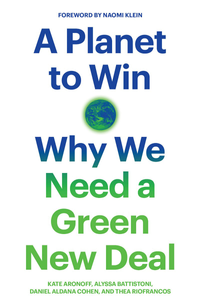
A Green New Deal is desperately required in the United States, to combat climate change and rampant inequality at the same time. In A Planet to Win: Why We Need a Green New Deal (Verso Books, 2019), authors Kate Aronoff, Alyssa Battistoni, Daniel Aldana Cohen and Thea Riofrancos explore how being on the brink of global disaster is also an opportunity for truly transformative change: building renewable energy sources, making public transportation free and ending the fossil fuel industry.
17. A Terrible Thing to Waste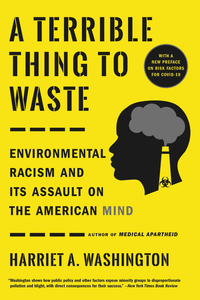
People of colour in the United States are disproportionately affected by pollution, infectious disease, industrial waste and insufficient sanitation services, causing irreparable physical harm—and, Harriet A. Washington argues, cognitive damage. A Terrible Thing to Waste: Environmental Racism and Its Assault on the American Mind (Little Brown Spark, 2019) examines the effects of environmental racism on marginalized communities and suggests what we can do to fix this devastating problem.
18. As Long as Grass Grows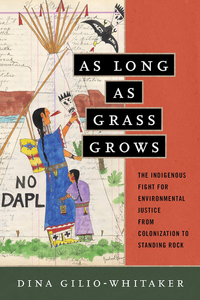
As Long as Grass Grows: The Indigenous Fight for Environmental Justice, From Colonization to Standing Rock (Beacon Press, 2019) outlines how Indigenous people have fought back against government and corporate intrusions upon their land for centuries. Dina Gilio-Whitaker argues that environmental activists should study Indigenous history for ideas and inspiration, in order to achieve a fair and sustainable future for everyone.
19. There’s Something in the Water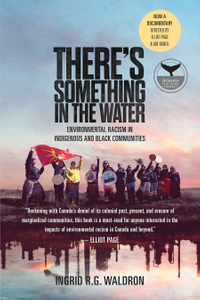
There’s Something in the Water: Environmental Racism in Indigenous and Black Communities (Fernwood Publishing, 2018) uses Nova Scotia as a case study to examine the health impacts of environmental racism in white settler societies such as Canada. Ingrid R.G. Waldron looks at how Indigenous and Black communities in Nova Scotia are resisting and fighting for environmental justice.
20. The Rise of the American Conservation Movement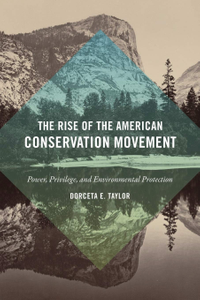
The Rise of the American Conservation Movement: Power, Privilege, and Environmental Protection (Duke University Press, 2016) explores the nascent environmental movement of the mid-1800s to the early 1900s, showing how race, class and gender influenced everything from establishing parks to protecting forests. Dorceta E. Taylor’s sweeping social history outlines how the white urban elites who led the conservation movement often made decisions that discriminated against the lower classes and people of colour.
21. Clean and White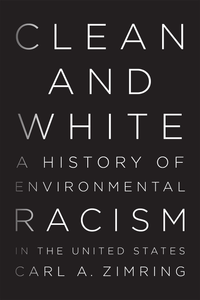
Clean and White: A History of Environmental Racism in the United States (NYU Press, 2016) explores ideas around race, environmentalism and social justice. In this provocative book, Carl A. Zimring draws upon historical evidence to reveal environmental racism throughout America’s past (and present), arguing that the pernicious belief that whites are clean and non-whites are unclean is still shaping racist behaviour and causing environmental inequalities today.
22. Braiding Sweetgrass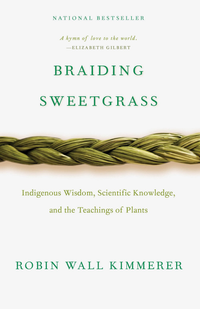
As a botanist, Robin Wall Kimmerer views nature through a scientific lens. As a member of the Citizen Potawatomi Nation, she embraces Indigenous teachings about the interconnectedness of all living things. Braiding Sweetgrass: Indigenous Wisdom, Scientific Knowledge and the Teachings of Plants (Milkweed Editions, 2015) combines her two perspectives into one educational and inspirational book, which is sure to encourage readers to play their part in restoring the natural world and fixing the climate crisis.
23. Black Faces, White Spaces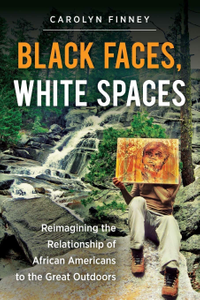
In Black Faces, White Spaces: Reimagining the Relationship of African Americans to the Great Outdoors (The University of North Caroline Press, 2014), Carolyn Finney draws upon movies, books, popular culture and history to examine how Black Americans are vastly underrepresented in outdoor recreation and the environmental movement. She explores the aftereffects of slavery, Jim Crow and racial violence to understand how nature and the environment became racialized in the United States.
24. Toxic Communities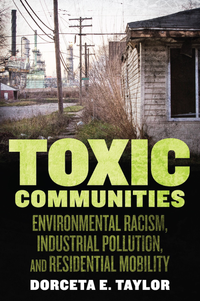
Toxic Communities: Environmental Racism, Industrial Pollution, and Residential Mobility (NYU Press, 2014) explores concepts of environmental justice. Dorceta E. Taylor draws upon case studies, both historical and modern, to examine the systemic issues that cause environmental hazards to be situated in poor and minority neighbourhoods far more often than in wealthier communities.
25. Cultivating Food Justice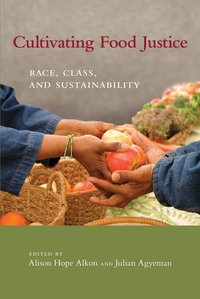
Cultivating Food Justice: Race, Class, and Sustainability (The MIT Press, 2011) looks at how people of colour and people living in poverty often have to survive in “food deserts,” without access to fresh, healthy, sustainable food. Edited by Alison Hope Alkon and Julian Agyeman, the book ties together ideas about food, environmentalism, justice and race, alternating between theory and practical strategies regarding sustainable agriculture.
26. Rooted in the Earth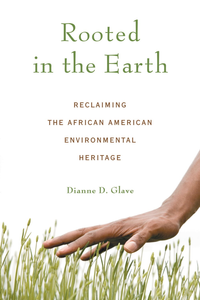
In Rooted in the Earth: Reclaiming the African American Environmental Heritage (Chicago Review Press, 2010), Dianne D. Glave contradicts the common narrative that Black Americans don’t feel connected to nature. She tells the history of Black environmentalism and Black naturalists, tracing the complicated relationship that Black people have with the environment.
27. Garbage Wars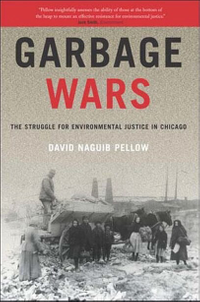
Garbage Wars: The Struggle for Environmental Justice in Chicago (The MIT Press, 2002) focusses on the politics of garbage. Sociologist David Naguib Pellow looks at conflicts over solid waste and pollution from 1880 to 2000 in Chicago, studying how low-income and minority communities are disproportionately affected by the environmental hazards of trash.
28. Dumping in Dixie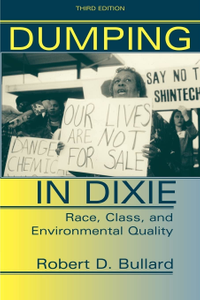
An early book by the “father of environmental justice,” Robert D. Bullard, Dumping in Dixie: Race, Class, and Environmental Quality (Routledge, 2000) looks at the economic, social and psychological impacts of building environmentally hazardous facilities in predominantly Black areas. Bullard outlines the barriers to environmental justice that these communities encounter all too often.
29. From the Ground Up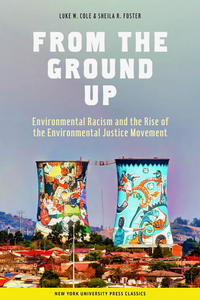
From the Ground Up: Environmental Racism and the Rise of the Environmental Justice Movement (NYU Press, 2000) tells captivating stories of communities across America that are fighting back against corporate polluters. Authors Luke W. Cole and Sheila R. Foster analyze the causes of environmental racism and trace the roots of the movement for environmental justice.





























